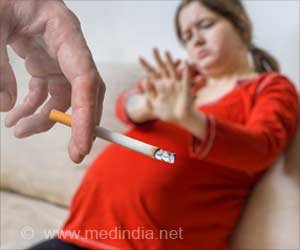Hear It From a Renowned Gynaecologist

Dr. Duru
Shah is the Scientific Director of Gynaecworld and the Gynaecworld Assisted
Fertility Center, Mumbai, India and is a Consultant to the Breach Candy Hospital,
Jaslok Hospital and Sir Hurkisondas Hospital in Mumbai, where she leads a
highly qualified team of Consultants who specialize in assisted reproductive
technologies, freezing of embryos, eggs, sperm, semen analysis, egg donation,
surrogacy and embryo donation.
Dr. Shah
has served as the President of the Federation of Obstetric and Gynaecological
Societies of India (FOGSI), and is currently the Senior Vice President of the Indian Society of Assisted Reproduction.
Advertisement
Q. How
does a husband’s habitual consumption of tobacco (smoking and non-smoking
forms) affect the wife’s reproductive health?
Ans. We have
enough evidence that shows that tobacco exposure both smoking and non-smoking
forms have an adverse effect on women’s reproductive health.
Second-hand exposure can
endanger the health of the mother and the baby. It can result in premature
aging of her eggs; smoking can also affect the hormone production and cause
inflammatory changes in the fallopian tube.
Men with long-term
tobacco exposure can have erectile dysfunction, and damaged
DNA in their sperm
indirectly affecting a woman’s reproductive function.
Q. What
are the maternal health effects of smoking on women smokers?
Ans. Smoking can
be one of the factors causing infertility. Smoking can also be a contributor
to increased miscarriage rates or still birth. Hence,
affecting the mother both physically and psychologically.
It may also result in
increased chances of a pregnancy that fails to attach to the womb but attaches
to the tube (ectopic pregnancy) instead, which always results in the
fetal death and can be potentially fatal for the mother.
Q. In
your article, you talked about third-hand smoke, could you tell us more about
the health consequences of third-hand smoke on babies/children?
Ans. Exposure to
second or third-hand smoking can have various adverse effects on the baby. There is an
increased risk of miscarriage, pre-term delivery, and low birth weight babies, still birth in such situation.
Infants that were
exposed to second and third-hand smoking have increased frequency of cold,
cough, wheeze and lung infections. They are also more susceptible to allergies
compared to their non-smoking counter parts.
These children also have
learning difficulty and an altered attention, behavior, and ability to reason
and understand.
The health consequences
of exposure to smoking does not end in infancy and childhood but continue into
adulthood, making them more prone to cancer and heart diseases.
Q. Can
smoking cessation make a huge difference for women’s health in India?
Ans. Cessation of
smoking definitely has benefits
Immediate Effects include
- Decreased levels
of carbon modioxide in the blood- within 24 hrs. - Improvement in
small airway function - Improvement in
blood viscosity
Short to
medium term
Pregnancy
related benefits from cessation are
- Decrease in LBW
(low birth weight), preterm birth, premature rupture of membranes - Decrease in
cardiovascular diseases - Marked reduction
in stroke (3-5 years) - Improvement in
oral health including cancer
Medium to
long term effects are decreased risk of
In
the words of Dr.Duru Shah, “smoking causes
infertility as it harms the eggs in women and sperms in men. Consumption of
smokeless tobacco during pregnancy leads to premature deliveries and also
prevents the babies from growing optimally whilst in the mothers’ wombs”.
Smoking cessation can help avoid low
birth weight, preterm birth, and premature breakage of the amniotic sac, and
contributes to infant and maternal health.
Source: Medindia
Source link
#Hear #Renowned #Gynaecologist



